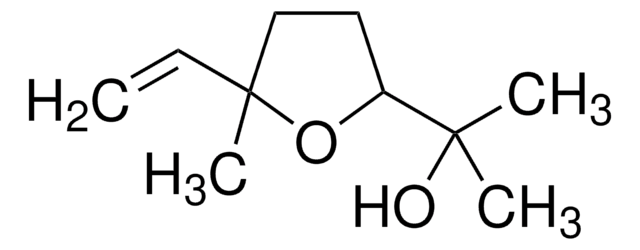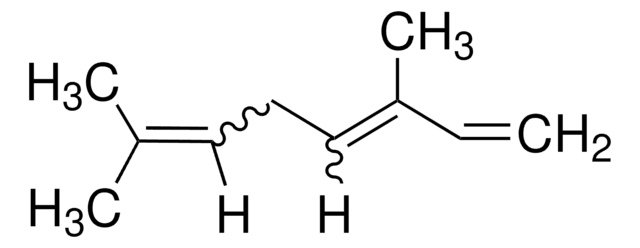W277207
Nerolidol
mixture of cis and trans, ≥97%, stabilized, FG
Synonym(s):
3,7,11-Trimethyl-1,6,10-dodecatrien-3-ol, 3-Hydroxy-3,7,11-trimethyl-1,6,10-dodecatriene
About This Item
Recommended Products
biological source
synthetic
Quality Level
grade
FG
Kosher
Agency
meets purity specifications of JECFA
reg. compliance
EU Regulation 1334/2008 & 872/2012
FCC
FDA 21 CFR 172.515
Assay
≥97%
contains
synthetic α-tocopherol as stabilizer
refractive index
n20/D 1.479 (lit.)
bp
114 °C/1 mmHg (lit.)
density
0.875 g/mL at 25 °C (lit.)
application(s)
flavors and fragrances
Documentation
see Safety & Documentation for available documents
food allergen
no known allergens
Organoleptic
green; floral; woody
SMILES string
C\C(C)=C/CC\C(C)=C\CCC(C)(O)C=C
InChI
1S/C15H26O/c1-6-15(5,16)12-8-11-14(4)10-7-9-13(2)3/h6,9,11,16H,1,7-8,10,12H2,2-5H3/b14-11+
InChI key
FQTLCLSUCSAZDY-SDNWHVSQSA-N
Looking for similar products? Visit Product Comparison Guide
Application
- Effects of Six Natural Compounds and Their Derivatives on the Control of Coccidiosis in Chickens.: This article discusses the use of natural compounds including nerolidol for controlling coccidiosis in poultry, indicating its applications in veterinary biochemistry and animal health (Hou et al., 2024).
Signal Word
Warning
Hazard Statements
Precautionary Statements
Hazard Classifications
Aquatic Acute 1 - Aquatic Chronic 1 - Eye Irrit. 2 - Skin Sens. 1
Storage Class Code
10 - Combustible liquids
WGK
WGK 2
Flash Point(F)
262.4 °F - closed cup
Flash Point(C)
128 °C - closed cup
Personal Protective Equipment
Choose from one of the most recent versions:
Already Own This Product?
Find documentation for the products that you have recently purchased in the Document Library.
Customers Also Viewed
Our team of scientists has experience in all areas of research including Life Science, Material Science, Chemical Synthesis, Chromatography, Analytical and many others.
Contact Technical Service


